than引导定语从句知识讲解
- 格式:doc
- 大小:17.50 KB
- 文档页数:5
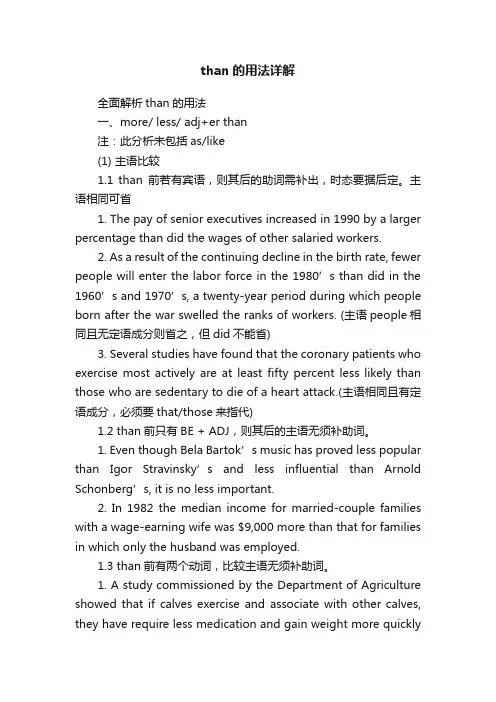
than的用法详解全面解析than的用法一、more/ less/ adj+er than注:此分析未包括as/like(1) 主语比较1.1 than前若有宾语,则其后的助词需补出,时态要据后定。
主语相同可省1. The pay of senior executives increased in 1990 by a larger percentage than did the wages of other salaried workers.2. As a result of the continuing decline in the birth rate, fewer people will enter the labor force in the 1980’s than did in the 1960’s and 1970’s, a twenty-year period during which people born after the war swelled the ranks of workers. (主语people相同且无定语成分则省之,但did不能省)3. Several studies have found that the coronary patients who exercise most actively are at least fifty percent less likely than those who are sedentary to die of a heart attack.(主语相同且有定语成分,必须要that/those来指代)1.2 than前只有BE + ADJ,则其后的主语无须补助词。
1. Even though Bela Bartok’s music has proved less popular than Igor Stravinsky’s and less influential than Arnold Schonberg’s, it is no less important.2. In 1982 the median income for married-couple families with a wage-earning wife was $9,000 more than that for families in which only the husband was employed.1.3 than前有两个动词,比较主语无须补助词。
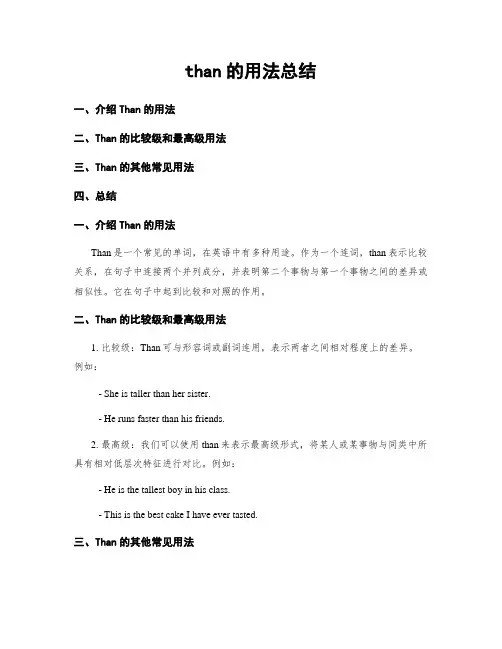
than的用法总结一、介绍Than的用法二、Than的比较级和最高级用法三、Than的其他常见用法四、总结一、介绍Than的用法Than是一个常见的单词,在英语中有多种用途。
作为一个连词,than表示比较关系,在句子中连接两个并列成分,并表明第二个事物与第一个事物之间的差异或相似性。
它在句子中起到比较和对照的作用。
二、Than的比较级和最高级用法1. 比较级:Than可与形容词或副词连用,表示两者之间相对程度上的差异。
例如:- She is taller than her sister.- He runs faster than his friends.2. 最高级:我们可以使用than来表示最高级形式,将某人或某事物与同类中所具有相对低层次特征进行对比。
例如:- He is the tallest boy in his class.- This is the best cake I have ever tasted.三、Than的其他常见用法1. Than引导从句:当一个从句与than连接时,意味着该从句提供了比较中所需的信息。
例如:- She works harder than anyone else in the office.2. Than引导非限制性定语从句:当我们想要进一步描述某人或某物,并与其他人或物进行比较时,可以使用than引导非限制性定语从句。
例如: - My sister, who is taller than me, loves playing basketball.3. Than也可以用作介词,表示“除了”、“比”等含义,常与不定式连用。
例如:- I have no choice other than to accept the offer.- She has more things to worry about than her grades.4. 在固定短语中:Than也出现在一些固定的短语中,如"rather than"、"other than"等。
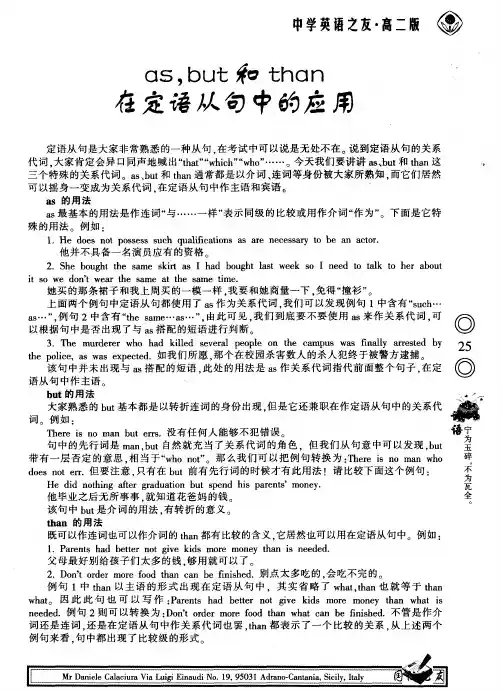
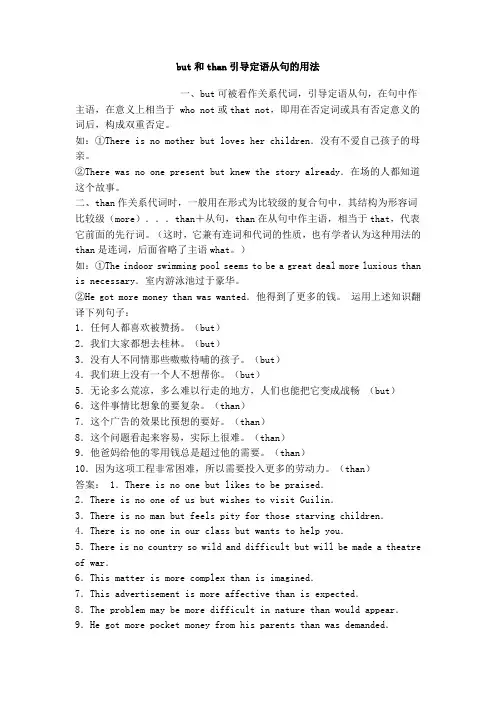
but和than引导定语从句的用法一、but可被看作关系代词,引导定语从句,在句中作主语,在意义上相当于 who not或that not,即用在否定词或具有否定意义的词后,构成双重否定。
如:①There is no mother but loves her children.没有不爱自己孩子的母亲。
②There was no one present but knew the story already.在场的人都知道这个故事。
二、than作关系代词时,一般用在形式为比较级的复合句中,其结构为形容词比较级(more)...than+从句,than在从句中作主语,相当于that,代表它前面的先行词。
(这时,它兼有连词和代词的性质,也有学者认为这种用法的than是连词,后面省略了主语what。
)如:①The indoor swimming pool seems to be a great deal more luxious than is necessary.室内游泳池过于豪华。
②He got more money than was wanted.他得到了更多的钱。
运用上述知识翻译下列句子:1.任何人都喜欢被赞扬。
(but)2.我们大家都想去桂林。
(but)3.没有人不同情那些嗷嗷待哺的孩子。
(but)4.我们班上没有一个人不想帮你。
(but)5.无论多么荒凉,多么难以行走的地方,人们也能把它变成战畅(but)6.这件事情比想象的要复杂。
(than)7.这个广告的效果比预想的要好。
(than)8.这个问题看起来容易,实际上很难。
(than)9.他爸妈给他的零用钱总是超过他的需要。
(than)10.因为这项工程非常困难,所以需要投入更多的劳动力。
(than)答案: 1.There is no one but likes to be praised.2.There is no one of us but wishes to visit Guilin.3.There is no man but feels pity for those starving children.4.There is no one in our class but wants to help you.5.There is no country so wild and difficult but will be made a theatre of war.6.This matter is more complex than is imagined.7.This advertisement is more affective than is expected.8.The problem may be more difficult in nature than would appear.9.He got more pocket money from his parents than was demanded.10.The project requires more labor than has been put in because it is extremely difficult.before 与until在日常的英语学习中,我们遇到before和until时,往往会将二者搞错。
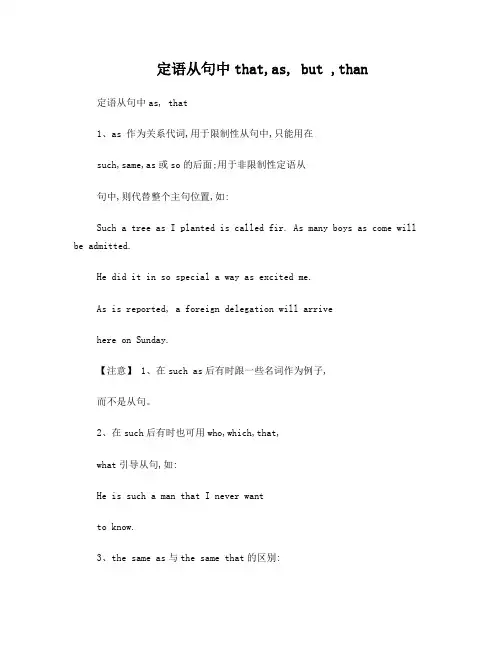
定语从句中that,as, but ,than定语从句中as, that1、as 作为关系代词,用于限制性从句中,只能用在such,same,as或so的后面;用于非限制性定语从句中,则代替整个主句位置,如:Such a tree as I planted is called fir. As many boys as come will be admitted.He did it in so special a way as excited me.As is reported, a foreign delegation will arrivehere on Sunday.【注意】 1、在such as后有时跟一些名词作为例子,而不是从句。
2、在such后有时也可用who,which,that,what引导从句,如:He is such a man that I never wantto know.3、the same as与the same that的区别:The same as表示表示与从句中的内容“相似”,the same that表示与从句中的内容是“同一”。
注意:当先行词由the same修饰时,偶尔也用that引导定语从句,但是和由as 所引导的定语从句意思不同She wore the same dress that she wore at Mary's wedding. 她穿着她在Mary婚礼上穿过的一条裙子。
She wore the same dress as her young sister wore.她穿着和她妹妹所穿的一样的裙子。
2、but 表“不”的意思,不太常用,表示“that/who/whom…not”的意思,引导限制性从句,常用在否定句中,如:There is no one but knows him. (= Everyone knows him.)3、than 作为关系代词,只和形容词、副词的比较级一起用,如:He has more books than is necessary. I stayed longer than is demanded by my boss.(【难点分析】(一)限制性定语从句只能用that 的几种情况1.当先行词是anything, everything, nothing, something , few, all, none, little, some 等代词时,或者是由every, any, all, some, no, little, few, much 等修饰时(1) Have you taken down everything that Mr. Li has said?(2) There seems to be nothing that seems impossible for him in the world.(3) All that can be done has been done.(4) There is little that I can do for you.【注意】 Any man that/who has a sense of duty won't do such a thing. That is all that I have to say.2. 当先行词被序数词修饰(1) The first place that they visited in London was the Big Ben.3. 当先行词被形容词最高级修饰时(1) This is the best film that I have seen.4. 当形容词被the very, the only修饰时(1) This is the very dictionary that I want to buy,(2) After the fire in his house, the old car is the only thing that he owned.当先行词指人时,偶尔也可以用who:(3) Wang Hua is the only person in our school who will attend the meeting/5. 当先行词前面有who, which等疑问代词时(1) Who is the man that is standing there?(2) Which is the T-shirt that fits me most?6. 当先行词既有人,也有动物或者物体时(1) Can you remember the scientist and his theory that we have learned?7、that常和以-ible和-able结尾的词一起用,如:There is no plan that is impossible. There is no road that is impassable.不能用that的几种情况:1、关系代词与它的动词若被隔开时,不能用that,而要用who,which等:I am ready to help any man who, in case he is in trouble, needs my help.2、在介词后面不可用that来代替物,可把介词放在从句的句末用that,也可省略:Here is the novel about which I told you. Here is the novel (that) I told you about.关系代词as和which 引导的定语从句as和which引导非限制性定语从句,有相同之处也有不同之处。
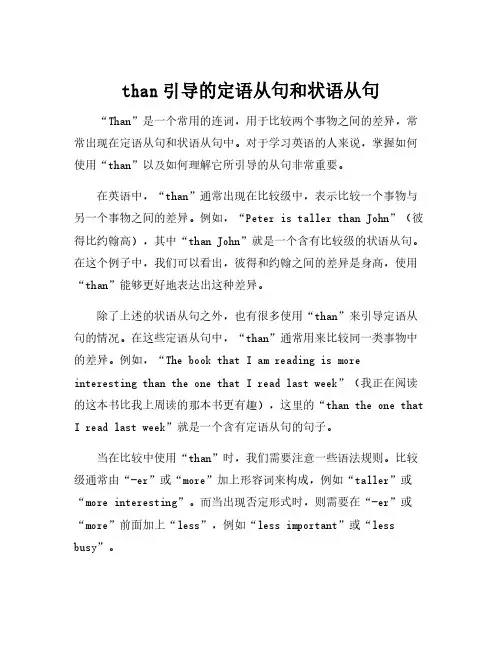
than引导的定语从句和状语从句“Than”是一个常用的连词,用于比较两个事物之间的差异,常常出现在定语从句和状语从句中。
对于学习英语的人来说,掌握如何使用“than”以及如何理解它所引导的从句非常重要。
在英语中,“than”通常出现在比较级中,表示比较一个事物与另一个事物之间的差异。
例如,“Peter is taller than John”(彼得比约翰高),其中“than John”就是一个含有比较级的状语从句。
在这个例子中,我们可以看出,彼得和约翰之间的差异是身高,使用“than”能够更好地表达出这种差异。
除了上述的状语从句之外,也有很多使用“than”来引导定语从句的情况。
在这些定语从句中,“than”通常用来比较同一类事物中的差异。
例如,“The book that I am reading is moreinteresting than the one that I read last week”(我正在阅读的这本书比我上周读的那本书更有趣),这里的“than the one that I read last week”就是一个含有定语从句的句子。
当在比较中使用“than”时,我们需要注意一些语法规则。
比较级通常由“-er”或“more”加上形容词来构成,例如“taller”或“more interesting”。
而当出现否定形式时,则需要在“-er”或“more”前面加上“less”,例如“less important”或“less busy”。
此外,我们还需要注意“than”所引导的从句中应该使用正确的主谓一致形式。
例如,“The athletes run faster than the spectators”(这些运动员跑得比观众快),这里的“run”是运动员的动词,而不是观众的动词。
总之,掌握“than”引导的定语从句和状语从句非常重要,可以帮助我们更好地表达比较和差异。
同时,需要注意语法规则和主谓一致形式,以避免语法错误。
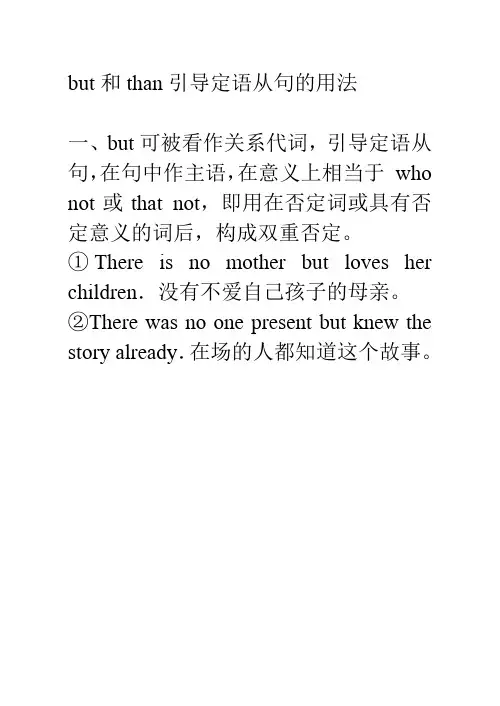
but和than引导定语从句的用法一、but可被看作关系代词,引导定语从句,在句中作主语,在意义上相当于who not或that not,即用在否定词或具有否定意义的词后,构成双重否定。
①There is no mother but loves her children.没有不爱自己孩子的母亲。
②There was no one present but knew the story already.在场的人都知道这个故事。
二、than作关系代词时,一般用在形式为比较级的复合句中,其结构为形容词比较级(more)...than+从句,than在从句中作主语,相当于that,代表它前面的先行词。
这时,它兼有连词和代词的性质①The indoor swimming pool seems to bea great deal more luxurious than is necessary.室内游泳池过于豪华。
②He got more money than was wanted.他得到了更多的钱。
运用上述知识翻译下列句子:1.任何人都喜欢被赞扬。
(but)2.我们大家都想去桂林。
(but)3.没有人不同情那些贫困的孩子。
(but)4.我们班上没有一个人不想帮你。
(but)5.这件事情比想象的要复杂。
(than)6.这个广告的效果比预想的要好。
(than)7.这个问题看起来容易,实际上很难。
(than)8.他爸妈给他的零用钱总是超过他的需要。
(than)答案:1.There is no one but likes to be praised.2.There is no one of us but wishes to visit Guilin.3.There is no man but feels pity for those poor children.4.There is no one in our class but wants to help you.5.This matter is more complex/ complicated than is imagined.6.This advertisement is more affective than is expected.7.The problem may be more difficult in nature than would appear.8.He got more pocket money from his parents than was demanded.5.无论多么荒凉,多么难以行走的地方,人们也能把它变成战场?(but)5.There is no country so wild and difficult but will be made a theatre of war.。
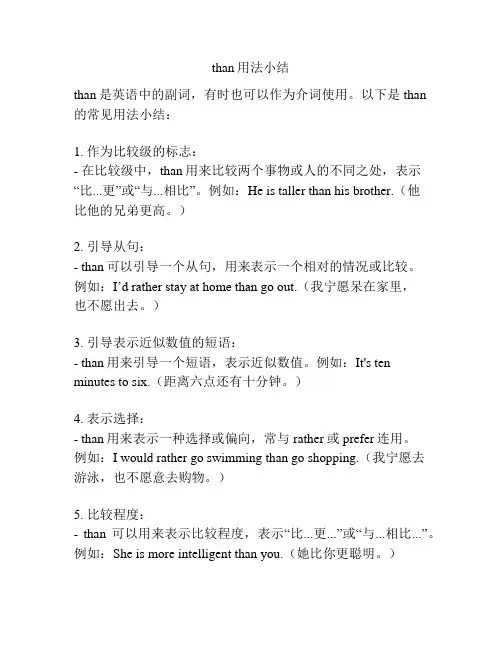
than用法小结than是英语中的副词,有时也可以作为介词使用。
以下是than 的常见用法小结:1. 作为比较级的标志:- 在比较级中,than用来比较两个事物或人的不同之处,表示“比...更”或“与...相比”。
例如:He is taller than his brother.(他比他的兄弟更高。
)2. 引导从句:- than可以引导一个从句,用来表示一个相对的情况或比较。
例如:I’d rather stay at home than go out.(我宁愿呆在家里,也不愿出去。
)3. 引导表示近似数值的短语:- than用来引导一个短语,表示近似数值。
例如:It's ten minutes to six.(距离六点还有十分钟。
)4. 表示选择:- than用来表示一种选择或偏向,常与rather或prefer连用。
例如:I would rather go swimming than go shopping.(我宁愿去游泳,也不愿意去购物。
)5. 比较程度:- than可以用来表示比较程度,表示“比...更...”或“与...相比...”。
例如:She is more intelligent than you.(她比你更聪明。
)6. 在否定句中使用:- than可以用来在否定句中表示“不如”。
例如:She is no better than her sister.(她不如她的姐姐好。
)7. 与rather连用表示情感倾向:- than可以与rather连用,表示对某种情感的倾向或态度。
例如:I would rather die than give up.(我宁愿死也不愿放弃。
)8. than用于除了上述情况以外的其他场合:- than在英语中还有许多其他用法,如在hardly...than...(几乎不...就...)、other than(除了...以外)等。
总之,than作为副词和介词,有着丰富的用法。
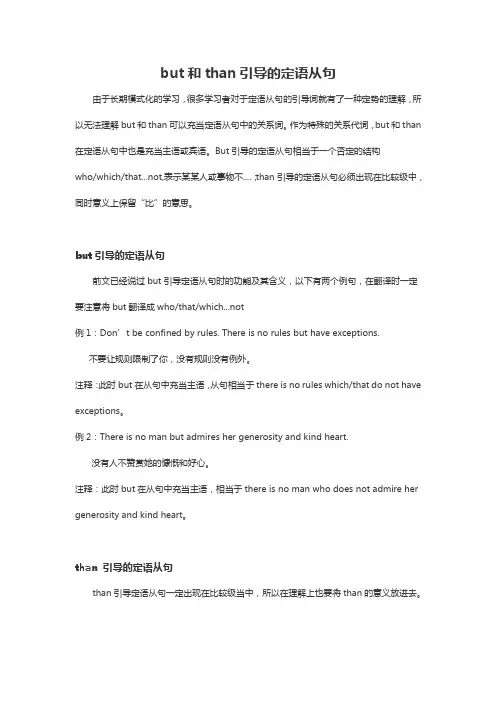
but和than引导的定语从句由于长期模式化的学习,很多学习者对于定语从句的引导词就有了一种定势的理解,所以无法理解but和than可以充当定语从句中的关系词。
作为特殊的关系代词,but和than 在定语从句中也是充当主语或宾语。
But引导的定语从句相当于一个否定的结构who/which/that...not,表示某某人或事物不....;than引导的定语从句必须出现在比较级中,同时意义上保留“比”的意思。
but引导的定语从句前文已经说过but引导定语从句时的功能及其含义,以下有两个例句,在翻译时一定要注意将but翻译成who/that/which...not例1:Don’t be confined by rules. There is no rules but have exceptions.不要让规则限制了你,没有规则没有例外。
注释:此时but在从句中充当主语,从句相当于there is no rules which/that do not have exceptions。
例2:There is no man but admires her generosity and kind heart.没有人不赞赏她的慷慨和好心。
注释:此时but在从句中充当主语,相当于there is no man who does not admire her generosity and kind heart。
than 引导的定语从句than引导定语从句一定出现在比较级当中,所以在理解上也要将than的意义放进去。
例1:Children today are likely to have less supervision at home than was common in the traditional family structure. (此时than在句中充当主语)与传统家庭结构相比,现代家庭结构中的孩子受到的管教表少了。
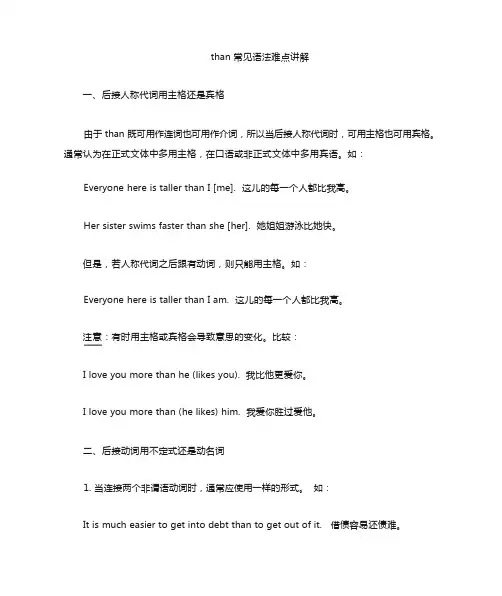
than 常见语法难点讲解一、后接人称代词用主格还是宾格由于 than 既可用作连词也可用作介词,所以当后接人称代词时,可用主格也可用宾格。
通常认为在正式文体中多用主格,在口语或非正式文体中多用宾语。
如:Everyone here is taller than I [me]. 这儿的每一个人都比我高。
Her sister swims faster than she [her]. 她姐姐游泳比她快。
但是,若人称代词之后跟有动词,则只能用主格。
如:Everyone here is taller than I am. 这儿的每一个人都比我高。
注意:有时用主格或宾格会导致意思的变化。
比较:I love you more than he (likes you). 我比他更爱你。
I love you more than (he likes) him. 我爱你胜过爱他。
二、后接动词用不定式还是动名词1. 当连接两个非谓语动词时,通常应使用一样的形式。
如:It is much easier to get into debt than to get out of it. 借债容易还债难。
He likes playing chess more than watching TV . 与看电视相比,他更喜欢下棋。
比较:He thinks it is safer to drive himself than (to) let me drive. =He thinks that drivinghimself is safer thanlettingme drive. 他认为他自己开车比让我开车要更安全些。
2. 若不是连接两个非谓语动词,则其后出现的动词通常用动名词形式 (虽然也可用不定式,但不如用动名词普通 )。
如:There are worse calamities than failing your driving test. 比起你驾驶考试不合格来说,更大的灾难还多着呢。
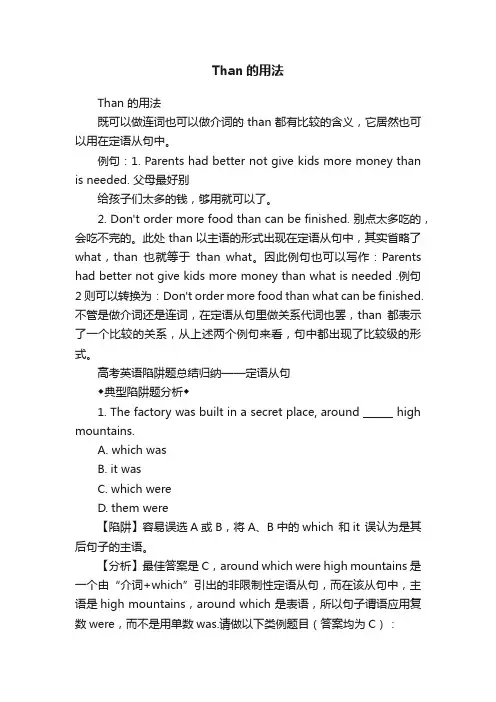
Than的用法Than 的用法既可以做连词也可以做介词的than都有比较的含义,它居然也可以用在定语从句中。
例句:1. Parents had better not give kids more money than is needed. 父母最好别给孩子们太多的钱,够用就可以了。
2. Don't order more food than can be finished. 别点太多吃的,会吃不完的。
此处than以主语的形式出现在定语从句中,其实省略了what,than也就等于than what。
因此例句也可以写作:Parents had better not give kids more money than what is needed .例句2则可以转换为:Don't order more food than what can be finished. 不管是做介词还是连词,在定语从句里做关系代词也罢,than都表示了一个比较的关系,从上述两个例句来看,句中都出现了比较级的形式。
高考英语陷阱题总结归纳——定语从句◆典型陷阱题分析◆1. The factory was built in a secret place, around ______ high mountains.A. which wasB. it wasC. which wereD. them were【陷阱】容易误选A或B,将A、B中的which 和it 误认为是其后句子的主语。
【分析】最佳答案是C,around which were high mountains 是一个由“介词+which”引出的非限制性定语从句,而在该从句中,主语是high mountains,around which 是表语,所以句子谓语应用复数were,而不是用单数was.请做以下类例题目(答案均为C):(1)Yesterday we visited a modern hospital, around _______ some fruit shops.A. which isB. it isC. which areD. them are(2)The murder happened in an old building, beside ______ the city police station.A. which areB. it isC. which isD. them are(3)Next month we’ll move to a new building, next to _______ a nice restaurants where we can have Chinese food.A. which areB. it isC. which isD. them are2. A man with a bleeding hand hurried in and asked, “Is there a hospital around ______ I can get some medicine for my wounded hand?”A. thatB. whichC. whereD. what【陷阱】容易误选B,认为around 是介词,选which 用以代替前面的名词hospital,在此用作介词around 的宾语。
than引导定语从句
than引导的定语从句,又称比较定语从句,即用于比较目的的定语从句,than引导的定语从句用来对前面的名词或代词作进一步的解释说明,在句中从句充当定语,句子的主干由than引导。
二、构成
than引导的定语从句常以than后介词短语或句子作补语,其结构为:
名词/代词/形容词(比较级)+than+介词短语/从句
三、用法
1、than后接介词短语
1. He is taller than me by five centimeters.
他比我高5厘米。
2. The price of this house is much higher than before.
这栋房子的价格比以前要高得多。
2、than后接从句
1. The boy is older than his sister can imagine.
这个男孩比他姐姐想象的要大得多。
2. She is younger than I expected.
她比我预料的要小。
- 1 -。
浅谈but和than引导的定语从句在初级英语阶段,学生知道引导定语从句的关系代词有who (whom, whose),that和which 等。
到了中高级阶段,这些显然是不够的。
还应了解but和than也可以用作关系代词的情况,以拓宽知识面,提高语言识别和理解能力。
1.but在英语句子中可用作关系代词,引导定语从句。
但应特别注意but虽然形式上是肯定的,意义上却是否定的。
这正是but和其它关系代词(who, that , which等)不同之处。
例如:(1)There is no rule in English but has exceptions.英语中没有无例外的规则。
(2)There is no old habit but may be cured by a strong will-power.通过强大的意志力没有改不了的旧习惯。
(3)With the introduction of the electronic computer, there is no complicated problem but can be solved in a few hours.由于引进了电子计算机,没有在几小时内解决不了的复杂问题。
(4)There is no human being but errs.没有不犯错误的人。
如果将以上例句(1)、(2)和(3)中的关系代词but改成that,或者将例句(4)中的关系代词but 改成that或who,那么定语从句必须改成否定从句才能与原句意义相一致。
例如:(5)There is no rule in English that has no exceptions/ that has not any exceptions.(6)There is no old habit that may not be cured by a strong will-power.(7)With the introduction of the electronic computer, there is no complicated problem that cannot be solved in a few hours.(8)There is no human being that(who)makes no mistakes/that(who)does not makes any mistakes. 【注意】如果(5)、(6)、(7)、(8)中没有明确的否定词no或not any等,其意义则完全相反。
关于than的一些用法:1、than从句的省略结构这种句式与as从句大致相同,它可以省去整个谓语部分,保留主语。
如:She eats less than a bird.还可以省去部分谓语成分,保留主语和be, have 或助动词。
如:John drove much more carefully than Tim did.We all love ourselves more and hate ourselves less than we ought.这种比较从句中的be, have 或助动词可以移至主语之前,进行倒装。
如:No leader of a party has kept himself in greater detachment from the sentiment of his than has the late Prime Minister.任何政党的领袖都没有像已故首相那样冷静沉着。
除此之外,比较从句也可以省去主要动词,保留其他部分。
如:He will not change his nature any more than a leopard will its spots.他绝不会改变本性,就像豹子决不会改变其身上的斑点一样。
还可以省去主语、谓语,保留宾语、修饰语。
如:He thinks about the work more than the money.It’s pleasurer travelling by day than by night.She is recovering; she is better than when I saw her last.2、than兼有连词和代词的性质在比较级句中,than 可以作代词,兼做连词和代词的性质。
有些学者认为这种用法的than是连词,后面缺省了主语what。
例如:The boy has eaten more food than is good for his health.Never give him more money than is necessary.That evening he drank more beer than had been his custom. 喝得比平常多。
浅谈but和than引导的定语从句在初级英语阶段,学生知道引导定语从句的关系代词有who (whom, whose),that和which等。
到了中高级阶段,这些显然是不够的。
还应了解but和than也可以用作关系代词的情况,以拓宽知识面,提高语言识别和理解能力。
1.but在英语句子中可用作关系代词,引导定语从句。
但应特别注意but虽然形式上是肯定的,意义上却是否定的。
这正是but和其它关系代词(who, that , which等)不同之处。
例如:(1)There is no rule in English but has exceptions.英语中没有无例外的规则。
(2)There is no old habit but may be cured by a strong will-power.通过强大的意志力没有改不了的旧习惯。
(3)With the introduction of the electronic computer, there is no complicated problem but can be solved in a few hours.由于引进了电子计算机,没有在几小时内解决不了的复杂问题。
(4)There is no human being but errs.没有不犯错误的人。
如果将以上例句(1)、(2)和(3)中的关系代词but改成that,或者将例句(4)中的关系代词but 改成that或who,那么定语从句必须改成否定从句才能与原句意义相一致。
例如:(5)There is no rule in English that has no exceptions/ that has not any exceptions.(6)There is no old habit that may not be cured by a strong will-power.(7)With the introduction of the electronic computer, there is no complicated problem that cannot be solved in a few hours.(8)There is no human being that(who)makes no mistakes/that(who)does not makes any mistakes. 【注意】如果(5)、(6)、(7)、(8)中没有明确的否定词no或not any等,其意义则完全相反。
定语从句中that,as, but ,than定语从句中as, that1、as 作为关系代词,用于限制性从句中,只能用在such,same,as或so的后面;用于非限制性定语从句中,则代替整个主句位置,如:Such a tree as I planted is called fir. As many boys as come will be admitted.He did it in so special a way as excited me.As is reported, a foreign delegation will arrivehere on Sunday.【注意】 1、在such as后有时跟一些名词作为例子,而不是从句。
2、在such后有时也可用who,which,that,what引导从句,如:He is such a man that I never wantto know.3、the same as与the same that的区别:The same as表示表示与从句中的内容“相似”,the same that表示与从句中的内容是“同一”。
注意:当先行词由the same修饰时,偶尔也用that引导定语从句,但是和由as 所引导的定语从句意思不同She wore the same dress that she wore at Mary's wedding. 她穿着她在Mary婚礼上穿过的一条裙子。
She wore the same dress as her young sister wore.她穿着和她妹妹所穿的一样的裙子。
2、but 表“不”的意思,不太常用,表示“that/who/whom…not”的意思,引导限制性从句,常用在否定句中,如:There is no one but knows him. (= Everyone knows him.)3、than 作为关系代词,只和形容词、副词的比较级一起用,如:He has more books than is necessary. I stayed longer than is demanded by my boss.(【难点分析】(一)限制性定语从句只能用that 的几种情况1.当先行词是anything, everything, nothing, something , few, all, none, little, some 等代词时,或者是由every, any, all, some, no, little, few, much 等修饰时(1) Have you taken down everything that Mr. Li has said?(2) There seems to be nothing that seems impossible for him in the world.(3) All that can be done has been done.(4) There is little that I can do for you.【注意】 Any man that/who has a sense of duty won't do such a thing. That is all that I have to say.2. 当先行词被序数词修饰(1) The first place that they visited in London was the Big Ben.3. 当先行词被形容词最高级修饰时(1) This is the best film that I have seen.4. 当形容词被the very, the only修饰时(1) This is the very dictionary that I want to buy,(2) After the fire in his house, the old car is the only thing that he owned.当先行词指人时,偶尔也可以用who:(3) Wang Hua is the only person in our school who will attend the meeting/5. 当先行词前面有who, which等疑问代词时(1) Who is the man that is standing there?(2) Which is the T-shirt that fits me most?6. 当先行词既有人,也有动物或者物体时(1) Can you remember the scientist and his theory that we have learned?7、that常和以-ible和-able结尾的词一起用,如:There is no plan that is impossible. There is no road that is impassable.不能用that的几种情况:1、关系代词与它的动词若被隔开时,不能用that,而要用who,which等:I am ready to help any man who, in case he is in trouble, needs my help.2、在介词后面不可用that来代替物,可把介词放在从句的句末用that,也可省略:Here is the novel about which I told you. Here is the novel (that) I told you about.关系代词as和which 引导的定语从句as和which引导非限制性定语从句,有相同之处也有不同之处。
t h a n引导定语从句
As、but和than通常都是以介词、连词等身份被大家所熟知,而它们居然可以摇身一变成为关系代词,在定语从句中做主语和宾语。
As As最基本的用法是做连词“与……一样”表示同级的比较,介词“作为”。
下面是它特殊的用法,
例句: 1. He does not possess such qualifications as are necessary to be an actor. 他并不具备一名演员应有的资格。
2. She bought the same skirt as I had bought last week so I need to talk to her about it so we don't wear them the same at the same time. 她买的那条裙子和我上周买的一模一样,我要和她商量一下,免得“撞衫”。
上面两个例句中定语从句都使用了as作为关系代词,我们可以发现例句1中含有“such…as…”,例句2中含有“the same…as…”,由此可见,我们到底要不要使用as来做关系代词,可以根据句中是否出现了与as搭配的短语进行判断。
3. The murderer who had killed several people on the campus was finally arrested by the police, as was expected. 如我们所愿,那个在校园杀害数人的杀人犯终于被警方逮捕。
该句中并未出现与as搭配的短语,此处的用法是as做关系代词指代前面整个句子,在定语从句中做主语。
But大家熟悉的but基本都是以转折连词的身份出现,但是它还兼职在做定语从句中的关系代词。
例句: There is no man but errs. 没有任何人能够不犯错误。
句中的先行词是man,but自然就充当了关系代词的角色,但我们从句意中可以发现,but带有一层否定的意思,相当于“who not”。
那么我们可以把例句转换为: There is no man who does not err. 但要注意,只有在but 前有先行词的时候才有此用法!请比较下面这个例句: He did nothing after graduation but spend his parents' money. 他毕业之后无所事事,就知道花爸妈的钱。
该句中but是介词的用法,有转折的意义。
Than即可以做连词也可以做介词的than都是比较的含义,它居然也可以用在定语从句中。
例句: 1. Parents had better not give kids more money than is needed. 父母最好别给孩子们太多的钱,够用就可以了。
2. Don't order more food than can be finished. 别点太多吃的,会吃不完的。
此处Than以主语的形式出现在定语从句中,其实省略了what,than也就等于than what。
例句也可以写作:Parents had better not give kids more money than what is needed 例句2则可以转换为:Don't order more food than what can be finished 不管是做介词、连词也好,在定语从句里做关系代词也罢,than都表示了一个比较的关系,从上述两个例句来看,句中都出现了比较级的形式。
一、but可被看作关系代词,引导定语从句,在句中作主语,在意义上相当于who not或that not,即用在否定词或具有否定意义的词后,构成双重否定。
如:①There is no mother but loves her children.没有不爱自己孩子的母亲。
②There was no one present but knew the story already.在场的人都知道这个故事。
二、than作关系代词时,一般用在形式为比较级的复合句中,其结构为形容词比较级(more)...than+从句,than在从句中作主语,相当于 that,代表它前面的先行词。
(这时,它兼有连词和代词的性质,也有学者认为这种用法的than是连词,后面省略了主语what。
)
如:①The indoor swimming pool seems to be a great deal more luxious than is necessary.室内游泳池过于豪华。
②He got more money than was wanted.他得到了更多的钱。
定语从句中的两个特殊关系代词
定语从句是中学阶段一个非常重要的语法项目,在各类考试中都能看到它的身影。
它的基本用法,想必读者朋友们已经掌握了吧!现由笔者为大家再介绍两个定语从句中的关系代词——but和than,以飨读者。
一. but
but在定语从句中作关系代词,通常情况下只能充当从句的主语。
此时,but为否定含义,相当于that…not或who…not,并且此时的主句多为否定句或疑问句。
例如:Not a man but had tears in his eyes.
没有一个人眼睛里不含着眼泪。
There was no one but knows that.
没有人不知道那件事。
There is no rule but has exception.
凡规则都有例外。
There is not one of us but wishes to help you/peace.
我们之中没有一个人不愿意帮助你/希望和平。
There is no tree but bears some fruit.
无树不结果。
(谚语)
二. than
than在定语从句中作关系代词,在从句中可以充当主语、宾语、表语,但仍以充当主语为多。
在定语从句中,它与关系代词that所起的语法作用是差不多
的,只是在翻译或解释时,要比that多一层比较的意味。
另外,由than含有比较意味可知,该类定语从句的先行词前通常要有形容词的比较级形式。
例如:You make more money than is intended to make.(主语)
你挣得的钱比预计的要多。
There was more casualties than was reported.
伤亡人数比报道的要多。
During the winter holidays, I made much more money than Li Ming did.(宾语)
在寒假期间,我挣的钱比李明多得多。
He got to know a famous writer who knew much more knowledge than his own (knowledge was).
他认识了一位比自己有更多知识的优秀作家。